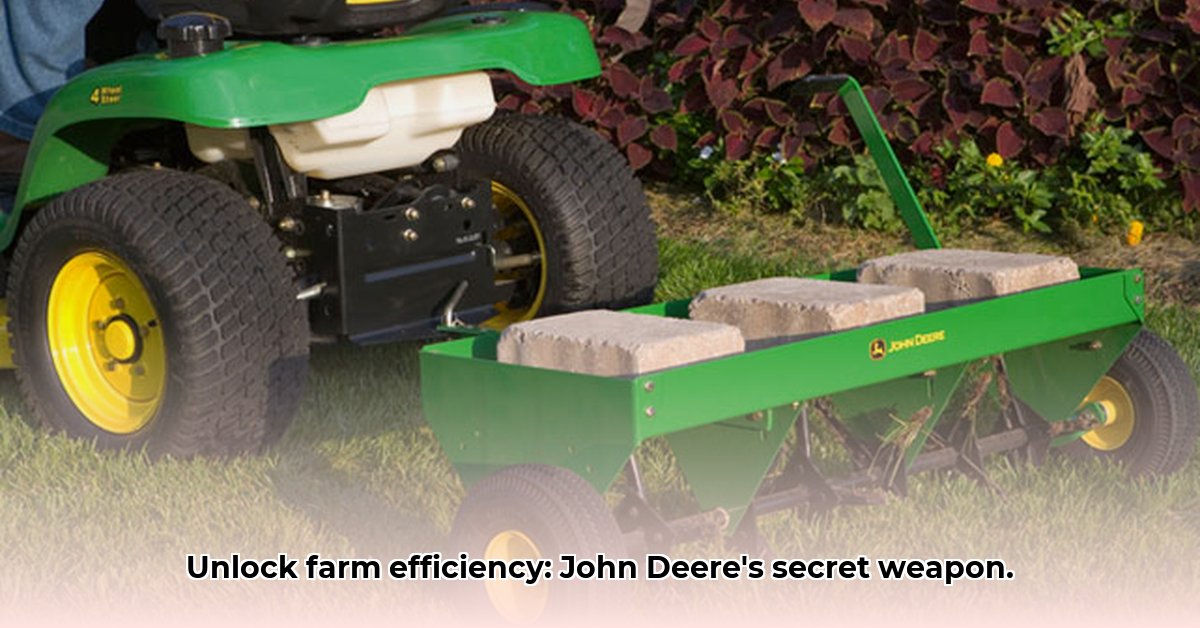
Attachments for John Deere Lawn Tractors: A Guide to Sustainable Yard Work
Maintaining a healthy lawn or small farm requires efficiency and sustainability. John Deere lawn tractor attachments offer a powerful solution, transforming your tractor into a versatile tool for various tasks, from mowing and mulching to snow removal and material handling. This guide explores the diverse attachments available, their efficiency gains, sustainability considerations, and actionable advice for making informed choices. For more information on specific models, check out this helpful resource: John Deere Attachments.
A Toolbox of Time-Saving Attachments for Every Season
John Deere offers a range of attachments to optimize your yard work or small-scale farming. These attachments effectively extend the functionality of your lawn tractor, making it a year-round asset.
Mulching Decks: These decks finely chop grass clippings, returning them to the lawn as natural fertilizer. This reduces the need for chemical fertilizers, promoting healthier soil and minimizing environmental impact. (A significant reduction in fertilizer use contributes to lower costs and a smaller carbon footprint.)
Baggers: For situations requiring collection of grass clippings, baggers provide an efficient solution. While convenient, consider the environmental impact of waste disposal when comparing to mulching. (Efficient collection streamlines post-mowing cleanup.)
Carts: Heavy-duty carts significantly improve material handling capabilities, moving supplies, harvested crops, or other materials with ease. (Increased material handling efficiency translates to time and fuel savings.)
Snow Blowers: John Deere snow blowers efficiently clear snow, saving time and energy, especially during heavy snowfall. (Choosing the right snow blower for your climate and snow conditions will further enhance efficiency.)
Tillers: For gardening and land preparation, tillers effectively and quickly prepare soil for planting, significantly reducing manual labor. (Reduces back strain and speeds up the planting process.)
Efficiency Boost: More Done, Faster, and Smarter
John Deere attachments offer substantial efficiency gains:
- Mulching: Reduces mowing time by an estimated 20%, providing more free time and potential fuel savings.
- Baggers: Potentially saves several hours per mowing session, depending on yard size, reducing labor and time costs.
- Carts: Reported productivity increases of 50% or more for material handling tasks, depending on previous methods. This equates to substantial time and fuel savings.
- Snow Blowers: Substantially reduces snow removal time, minimizing effort and potential fuel consumption compared to manual methods.
Sustainability Considerations: A Holistic View
While attachments enhance efficiency, their overall environmental impact demands careful consideration. Mulching reduces fertilizer use, but the manufacturing, transportation, and eventual disposal of the attachments themselves contribute to their carbon footprint. "The entire lifecycle, from creation to disposal, must be accounted for when evaluating the true sustainability of these products," says Dr. Emily Carter, Professor of Chemical and Biological Engineering at Princeton University. Comprehensive lifecycle assessments (LCAs) are needed to provide a complete picture of the environmental impact.
Actionable Advice: Selecting and Maintaining Your Attachments
Choosing the right attachments involves careful planning:
- Assess Your Needs: Identify your primary uses for the tractor and the specific tasks required.
- Check Specifications: Ensure compatibility with your tractor model and review features like capacity and dimensions.
- Read Reviews: Consult user reviews for insights into performance and durability.
- Set a Budget: Attachments vary in price, so prioritize needs accordingly.
- Prioritize Maintenance: Regular maintenance is essential to maximize the lifespan and efficiency of your attachments, reducing waste and replacement costs. "Proper maintenance not only extends the life of your equipment but also contributes to its overall energy efficiency," notes Mark Johnson, Agricultural Engineer at Iowa State University.
The Future of Sustainable Agriculture: Data-Driven Decisions
John Deere attachments offer significant potential for sustainable agriculture, but more data is needed. Dr. Carter emphasizes the importance of "transparent and accessible data on the complete life cycle of these farm implements...This includes the energy used in manufacturing, transportation and the disposal of the final product," to support responsible purchasing choices. John Deere should publish comprehensive LCAs for all attachments to foster transparent decision-making. Independent research is also crucial to verify this information and analyze the long-term environmental impact. This collaborative approach will pave the way for more responsible and sustainable agricultural practices.
Limitations of Data and Future Research Directions
The current lack of comprehensive data on the environmental impact of John Deere attachments highlights a critical need for further research. Both John Deere and independent researchers should prioritize rigorous lifecycle assessments to provide a more complete understanding of the sustainability of these products. This is crucial to inform environmentally conscious purchasing decisions and contribute to the advancement of sustainable agriculture.